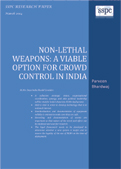Modi’s Bhutan Sojourn: Why China Reads Between the Lines?
On May 16, 2014, the world’s biggest democracy and Asia’s rapidly rising power, India announced results of history’s longest and biggest multiparty democratic elections. Held in nine phases spreading across April-May 2014, the country chose to bring in power the government of Narendra Damodardas Modi, leader of the Bhartiya Janata Party (BJP)- known for his unconventional but successful policies.





